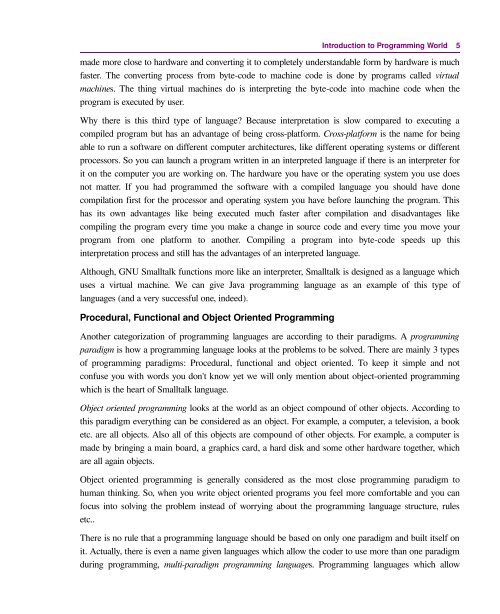Computer Programming with GNU Smalltalk - Free
Computer Programming with GNU Smalltalk - Free
Computer Programming with GNU Smalltalk - Free
Create successful ePaper yourself
Turn your PDF publications into a flip-book with our unique Google optimized e-Paper software.
Introduction to <strong>Programming</strong> World 5<br />
made more close to hardware and converting it to completely understandable form by hardware is much<br />
faster. The converting process from byte-code to machine code is done by programs called virtual<br />
machines. The thing virtual machines do is interpreting the byte-code into machine code when the<br />
program is executed by user.<br />
Why there is this third type of language? Because interpretation is slow compared to executing a<br />
compiled program but has an advantage of being cross-platform. Cross-platform is the name for being<br />
able to run a software on different computer architectures, like different operating systems or different<br />
processors. So you can launch a program written in an interpreted language if there is an interpreter for<br />
it on the computer you are working on. The hardware you have or the operating system you use does<br />
not matter. If you had programmed the software <strong>with</strong> a compiled language you should have done<br />
compilation first for the processor and operating system you have before launching the program. This<br />
has its own advantages like being executed much faster after compilation and disadvantages like<br />
compiling the program every time you make a change in source code and every time you move your<br />
program from one platform to another. Compiling a program into byte-code speeds up this<br />
interpretation process and still has the advantages of an interpreted language.<br />
Although, <strong>GNU</strong> <strong>Smalltalk</strong> functions more like an interpreter, <strong>Smalltalk</strong> is designed as a language which<br />
uses a virtual machine. We can give Java programming language as an example of this type of<br />
languages (and a very successful one, indeed).<br />
Procedural, Functional and Object Oriented <strong>Programming</strong><br />
Another categorization of programming languages are according to their paradigms. A programming<br />
paradigm is how a programming language looks at the problems to be solved. There are mainly 3 types<br />
of programming paradigms: Procedural, functional and object oriented. To keep it simple and not<br />
confuse you <strong>with</strong> words you don't know yet we will only mention about object-oriented programming<br />
which is the heart of <strong>Smalltalk</strong> language.<br />
Object oriented programming looks at the world as an object compound of other objects. According to<br />
this paradigm everything can be considered as an object. For example, a computer, a television, a book<br />
etc. are all objects. Also all of this objects are compound of other objects. For example, a computer is<br />
made by bringing a main board, a graphics card, a hard disk and some other hardware together, which<br />
are all again objects.<br />
Object oriented programming is generally considered as the most close programming paradigm to<br />
human thinking. So, when you write object oriented programs you feel more comfortable and you can<br />
focus into solving the problem instead of worrying about the programming language structure, rules<br />
etc..<br />
There is no rule that a programming language should be based on only one paradigm and built itself on<br />
it. Actually, there is even a name given languages which allow the coder to use more than one paradigm<br />
during programming, multi-paradigm programming languages. <strong>Programming</strong> languages which allow

















